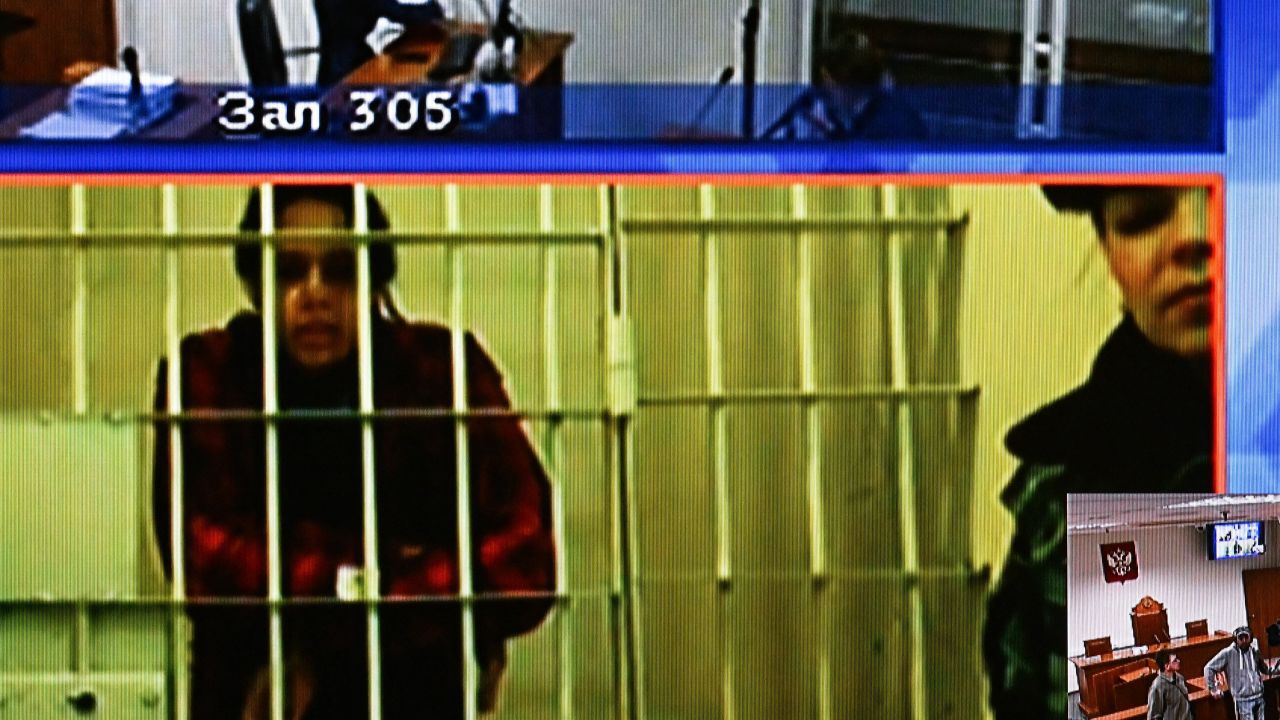Vanessa Nygaard: Brittney Griner continues to be an example 0:26
(Reuters) --
Boring manual labor, poor hygiene and lack of access to medical care: those are the conditions that await American basketball star Brittney Griner in a Russian penal colony after she lost an appeal last week. appeal against a nine-year drug conviction.
It's a world familiar to Maria Alyokhina, a member of the feminist arts group Pussy Riot who spent nearly two years as an inmate for her part in a 2012 punk protest at a Moscow cathedral against President Vladimir Putin.
Brittney Griner will be in a Russian prison for another six months
The first thing to understand, Alyokhina said in an interview, is that a penal colony is not an ordinary prison.
"This is not a cell building. This looks like a strange town, like a Gulag labor camp," he said, referring to the vast penal network set up by Soviet dictator Josef Stalin to isolate and break down inmates.
"It's actually a labor camp because by law all prisoners have to work. The most cynical thing about this job is that prisoners often sew Russian army and police uniforms for almost no pay."
The colony was divided between a factory area where inmates made garments and gloves, and a "living area" where, according to Alyokhina, 80 women lived in a single room with only three toilets and no hot water.
advertising
Griner, a two-time Olympic gold medalist, could soon be transferred to a colony in the absence of a new appeal or an agreement between Washington and Moscow to exchange her for a Russian arms dealer imprisoned in the United States, a possibility that was considered. months ago but has yet to materialize.
American basketball player Brittney Griner is seen on a screen via video link from a remand prison before a court hearing to consider an appeal against her nine-year sentence, at the Moscow regional court on October 25, 2019. 2022. Credit: Kirill Kudryavtsev/AFP/Getty Images
harsh standards
In a Pussy Riot show that has gone around the world and is now being performed in Britain, Alyokhina relives memories of her days as a recluse: snowy prison yards, plank-like beds, long spells of isolation and punishments for minor infractions, such as an unbuttoned coat or a misplaced ID.
Prison guards were constantly filming her "because I'm a 'famous provocateur,'" she added.
The Russian prison service did not respond to a request for comment for this article.
Former US military officer Trevor Reed describes his release from Russian prison
Yelena, a more recent detainee from the penal colony, described a regime similar to the one Alyokhina experienced a decade ago.
Yelena, 34, served eight years in a Siberian colony after being convicted of drug possession.
She said that she was paid about 1,000 rubles (US$16) a month to work 10 to 12 hours a day in a sewing workshop.
"Girls with strong, athletic builds are often assigned much heavier jobs. For example, carrying sacks of flour for the prison bakery or unloading mountains of coal," she explains.
Prisoners could be punished for unexplained "crimes," such as placing a wristwatch on the nightstand.
The worst sanction was isolation, known as "the Vatican."
"Just as the Vatican is a state within a state, isolation is a prison within a prison," Yelena said.
A gynecologist visited her neighborhood monthly, where there are more than 800 imprisoned women.
"If you do the math, what are the chances you'll get a doctor? Practically zero," he said.
Language barrier
For a foreigner with little or no Russian, it is more difficult to navigate the system and deal with isolation.
The brother of Paul Whelan, a former U.S. Marine serving 16 years in a Russian penal colony on espionage charges he denies, said he is allowed one 15-minute phone call a day to his parents, he cannot call other family or friends and do not have access to email or the internet.
David Whelan said his brother must work at least eight hours a day, six days a week, doing menial tasks like buttonhole work, which has caused him repetitive strain injuries.
Inmates sleep in barrack-like buildings and access to many necessities, including medicine, depends on paying bribes to prison guards, he said.
American Paul Whelan speaks to CNN from a Russian prison
Conditions may depend largely on the whims of the guards, the warden, or older inmates.
Paul seems to use his military training "to get through the day, to know which battles to fight and which ones not to fight," said David Whelan.
"His phone calls, even to our parents, are recorded. All his letters are translated before he leaves. So you know that everything you do is being watched and you really have no sense of individuality."
Alyokhina said that receiving cards and letters from the outside world offered a rare ray of hope, and she urged people to support Griner in that way.
He said they should use machine translation and send the text in both English and Russian so that it would more easily pass the prison censor.
"Don't leave anyone alone with this system," he said.
"It's totally inhumane, it's a Gulag, and when you're lonely there, it's much easier to give up."
Brittney Griner

